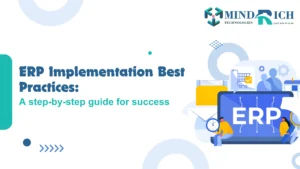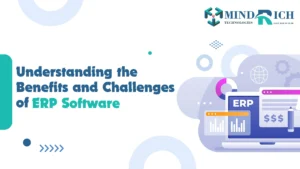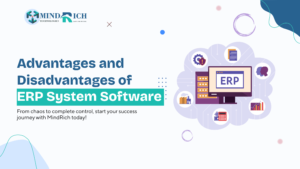Maintaining efficiency and competitiveness in the quickly changing corporate environment of today is essential for success. Enterprise Resource Planning (ERP) software are a crucial tool that businesses are utilizing to reorganize their processes and increase efficiency. We will delve into the world of ERP in this blog, examine its importance, advantages, and capabilities, and illustrate how MindRich Technologies can help you use ERP to its full potential for your company.
What is Enterprise Resource Planning (ERP)?
ERP stands for Enterprise Resource Planning, a comprehensive business management software solution designed to help organizations manage and optimize their core business processes. These processes include finance, human resources, supply chain, manufacturing, customer relationship management, and more. ERP systems serve as a centralized hub that enables seamless data flow, collaboration, and decision-making across different departments within an organization.
A Brief History of ERP (Enterprise Resource Planning)
The origins of ERP (Enterprise Resource Planning) lie in the early 1960s. When manufacturing brought about systems of controlling and managing inventory. In the 1970s came the development of Material Requirements Planning (MRP) systems to assist manufacturers with production scheduling and managing materials. In the 1980s, MRP II was developed to cover more manufacturing processes. The “ERP” name gained popularity in the 1990s. When the systems moved past manufacturing to cover accounting, HR, and supply chain functions. The past two decades have seen ERP evolve further with the addition of advanced analytics, cloud computing, and insights from AI.
Types of ERP Software
Understanding the different types of ERP software is essential for choosing the right solution tailored to your organization’s size, industry, and IT infrastructure. Here are the most common types of ERP systems:
1. On-Premises ERP
On-premises ERP systems are implemented directly on a corporation’s servers and hardware. They grant overall control and configuration but are very capital-intensive in terms of infrastructure and IT staffing. They are best suited to firms with rigorous data protection policies or extremely precise operational demands.
Pros:
- Greater control over data and system
- Highly customizable
- No reliance on internet connectivity
Cons:
- High upfront and maintenance costs
- Longer implementation time
- Requires dedicated IT staff
2. Cloud ERP
Cloud ERP (Enterprise Resource planning) is hosted by the vendor on their servers and accessed over the internet. It offers flexibility and scalability and it is less costly initially. Cloud ERP systems are also automatically updated and are best suited to firms wanting to minimize IT workload and infrastructure expenses.
Pros:
- Lower upfront costs
- Easy scalability
- Automatic updates and maintenance
Cons:
- Less control over data
- Internet connectivity required
- Potential data security concerns
3. Hybrid ERP
A hybrid ERP model features both on-premises and cloud solutions. Businesses retain the on-premises location to hold their delicate or key functions but utilize the cloud ERP for other activities. This is ideal for organizations undergoing a transition to the cloud or having compliance requirements.
Pros:
- Flexible deployment
- Allows phased cloud migration
- Customizable to business needs
Cons:
- Can be complex to manage
- Higher integration requirements
- Potential cost inefficiencies
4. Open Source ERP
Open source ERP systems provide users with the source code so they can personalize the software to their requirements. The systems are usually low- or even no-cost and are preferred by organizations with internal development capacities seeking flexibility.
Pros:
- Highly customizable
- Lower software costs
- Strong community support
Cons:
- Requires technical expertise
- Limited vendor support
- Potential security vulnerabilities if not properly managed
5. Industry-Specific ERP
These ERPs are custom-designed to address the distinctive requirement of particular industries like manufacturing, healthcare, retail, or construction. They are pre-loaded with modules and functionalities pertaining to the respective industry’s workflow.
Pros:
- Industry-tailored features
- Reduced need for customization
- Faster implementation
Cons:
- Limited flexibility outside the specific industry
- Potentially higher cost due to specialization
6. Small Business ERP
Tailored to the needs of SMEs, small business ERPs emphasize core features and easier-to-use interfaces with less expense. They commonly include cloud deployment to minimize IT overhead and accommodate fast growth.
Pros:
- Affordable pricing
- User-friendly interface
- Scalable as business grows
Cons:
- May lack advanced features
- Limited customization
- Might need upgrades as business scales
Each ERP type offers unique benefits and trade-offs. Selecting the right ERP (enterprise resource planning) depends on business size, industry, budget, and future growth plans.
Why is ERP Important?
- Integration and Data Accuracy: ERP systems integrate various departments and functions, eliminating data silos. This ensures that accurate, up-to-date information is readily available to all authorized users.
- Streamlined Processes: ERPs automate and streamline business processes, reducing manual effort and potential errors. This leads to increased efficiency and productivity.
- Informed Decision-Making: With real-time data access, businesses can make wise decisions quicker and more successfully respond to changing consumer demands and the market.
- Scalability: ERP systems are scalable, enabling firms to expand without experiencing significant business disruptions.
- Regulatory Compliance: Many industries have strict regulatory requirements. ERPs help ensure compliance by providing tools for tracking and reporting.
Benefits of Enterprise Resource Planning (ERP)
- Improved Efficiency: By automating routine tasks and providing real-time data, ERP systems boost operational efficiency.
- Enhanced Customer Service: Access to customer data and order histories enables better customer service and support.
- Cost Savings: Streamlined processes and reduced errors result in cost savings over time.
- Strategic Planning: ERP data facilitates strategic planning and helps businesses stay competitive.
- Data Security: ERPs include security features to protect sensitive business data.
Main Modules of an ERP Software System
An Enterprise Resource planning software system consists of various key modules that integrate business processes and organizational data. Below are the modules:
Core ERP Modules
- Finance & Accounting: Maintains general ledger, accounts payable/receivable, budgeting, and financial reporting.
- Human Resources (HR): Deals with recruitment, payroll, performance management, and employee records.
- Inventory Management: Maintains levels of inventory, orders, sales, and deliveries.
- Procurement: Automates purchasing-related activities and supplier management.
- Manufacturing: Involves production planning, scheduling, and quality control.
- Sales & CRM: Deals with customer relations, lead management, and order management.
Additional ERP Modules
- Order Management: Improves order efficiency from acceptance to fulfillment by ensuring Smooth Processing and Tracking.
- Warehouse Management: Enhances the inventory flow and storage within a warehouse to save costs.
- Business Intelligence (BI): Data analysis and visualization tools
- Project management: Tracks progress, resources, and budgets
- E-commerce Integration: Synchronizes ERP system with online sales channels
- Compliance Management: Ensures the Company meets Industry Regulations
- Supply Chain Management (SCM): Provides Visibility across Supply Chain Activities
How Do ERP Systems Work?
Data from numerous business operations is gathered and stored by ERP software system in a centralized database to perform their functions. This data is accessible to users via an intuitive user interface. Order management, inventory control, and financial reporting are just a few of the tasks that the ERP software automates using a set of predetermined rules and workflows. Accuracy, efficiency, and consistency are all improved by this automation.
Common ERP Examples
There are several ERP software solutions available in the market, catering to different industries and business sizes. Some common ERP examples include:
- Odoo: An open-source ERP platform known for its modular structure and customizable nature.
- SAP: SAP, which is renowned for its powerful capabilities, provides ERP solutions for companies of all sizes and in all sectors.
- NetSuite: Known for its scalability and flexibility, NetSuite is a cloud-based ERP system.
- Dynamics 365: This ERP solution offers a wide range of functionalities and connects smoothly with other Microsoft products.
Reasons to Move to a Cloud ERP Software Solution
Businesses today must chase agility, efficiency, and innovation, forcing a transition away from archaic ERP software toward cloud alternatives. Here are some compelling reasons to switch:
- Low Initial Investment: Cloud ERP systems do not require heavy hardware or infrastructures. This reduces upfront capital expenditure.
- Scalability: Cloud ERP can perfectly scale as per business needs, either expanding operations or adding new users.
- Automatic Updates: Vendors take care of the software updates and maintenance, so your system is always provided with the latest features and security patches.
- Access: Any ERP service that is hosted on the cloud can be accessed from any point in this universe that has an internet connection; it supports working remotely and via mobile.
- Better Security: Top-tier cloud ERP providers spend heavily on security measures, providing data protection that often outpaces that of many vendors.
- Faster Implementation: Cloud ERP, most of the time, has a faster deployment time compared to on-premise systems.
- Reduction in IT Burden: Hosting and maintenance of cloud ERP programs are taken by the vendors, allowing the internal IT team to put focus on strategic initiatives.
- Disaster Recovery: The true value of disaster recovery comes from having the protection of amount-down operations for restore should be an immediate Cloud backup during the shifting shadow Recovery Plan.
- Real-Time Insights: Cloud-based ERP systems enable more advanced analytics and data availability that present real-time reports to decision-makers.
Also Read: Benefits Of Cloud Based ERP Software For Businesses
5 ERP Implementation Challenges
Installing an ERP system is a gigantic undertaking, capable of radically metamorphosing business dealings whilst presenting its own challenges. Should these hurdles be foreseen, an organization can plan efficiently and save itself from costly misadventures. Let us talk about some common challenges for an ERP (Enterprise resource planning) implementation:
1. Poor Planning and Requirement Analysis
Understanding the business requirements is a very crucial step for any ERP implementation. If the planning is not proper or objectives are not clearly defined, an ERP system may be put in place that does not fit actual business needs.
2. Resistance to Change
Employees often resist the adoption of new systems just because of unwillingness to accept the change or somewhat being uncertain of how the change will affect their jobs. In the absence of good change management and proper user training, this resistance can take the implementation process into disruption or cause severe slowing down.
3. Issues with Data Migration
Moving data from legacy systems to a new ERP platform endangers complexity. If there is inaccurate, incomplete data migration, the new system would not perform its duty effectively.
4. Cost and Time Are Underestimated
Most of the cases run into budget overrun and schedule slack during an ERP implementation. Hidden costs such as customization, training, and even support from the go-live date are rarely taken into account in the initial planning phase.
5. Lack of Internal ERP Expertise
Implementation of an ERP is a specialist field. Organizations that apart from having internal expertise will have difficulties with configuration, integration, and providing ongoing support unless they hire qualified resources or trustworthy consultants thereof.
The Future of ERP
Since technology is changing at a fast pace, ERP systems are also undergoing a paradigm shift. The future of ERP is to become much more intelligent and agile as it becomes more user-centric. Contemporary ERP solutions will have to become central to enabling businesses to compete in an ever-changing digital economy. The following are some of the main trends influencing the future of ERP:
1. AI and Machine Learning Integration
ERP systems are now increasingly infused with increased levels of artificial intelligence (AI) and machine learning. These will automate manual work, provide predictive analytics and aid organizations in making improved data-driven decisions.
2. Cloud-First Strategy
Cloud ERP will also rule the roost because of their flexibility, scalability, and affordability. The next-generation ERP systems will most probably have cloud-native architectures to deploy and integrate seamlessly.
3. Internet of Things (IoT) Integration
As connected devices increase in number, ERP systems will combine with IoT solutions to monitor and analyze real-time data from machinery and sensors and other endpoints—particularly in manufacturing and logistics.
4. Modular and Composable Architecture
ERP systems in the future will shift from monolithic architecture towards modular and composable platforms. Companies will have the ability to construct and scale their ERP functions according to requirements.
5. Improved cybersecurity
As data protection and cybersecurity become increasingly important, next-generation ERP solutions will integrate enhanced security features such as encrypting data and two-factor authentication and threat intelligence using AI.
6. Sustainability and ESG Tracking
ERP systems will increasingly support sustainability goals with the addition of features to track environmental, social, and governance (ESG) metrics and compliance.
How MindRich Technologies Can Help You with the Best ERP?
At MindRich Technologies, we recognize that each business is different and has particular needs. In order to understand our clients’ objectives and provide customized ERP solutions, our team of ERP professionals collaborates closely with them. This is how we can help you:
- Customized ERP Implementation: To ensure a seamless transition, we’ll set up an ERP system that matches your company’s business procedures.
- Training and Support: Our experts provide comprehensive training and ongoing support to ensure your team can maximize the benefits of your ERP system.
- Integration and Expansion: We help you integrate your ERP system with other tools and offer guidance on scaling your ERP as your business grows.
- Continuous Improvement: We assist in fine-tuning and optimizing your ERP to adapt to changing business needs.
Frequently Asked Question (FAQ)
What is ERP in simple terms?
Let’s say your enterprise comprises several departments: sales, accounting, inventory tracking, and customer service. Each might use its own separate tools and spreadsheets. ERP (Enterprise Resource Planning) is the central brain tying all these departments together. It is a single system through which all departments in a business share information and work together smoothly. ERP software ensures organization of data and efficiency in business operations.
What are the 3 common types of ERP?
- On-Premise ERP: This type of ERP means owning your own server and keeping the ERP software on your own computers, within your office. It is directly managed by you.
- Cloud-Based ERP (SaaS ERP): This is like renting the software over the internet. The service provider hosts it on their servers, while you access it through your web browser. The payment is mostly done monthly or annually, like a subscription.
- Hybrid ERP: This is somewhat like a combination of the above. Some parts of the ERP system might be on your own servers, i.e., on-premises, while others might be residing in the cloud. This gives businesses great flexibility.
Why is Enterprise Resource Planning (ERP) used?
- Better Organization: It takes all the business data and puts all the data in a place so that everyone works using the same set of up-to-date data.
- More Efficiency: It gives you plenty of room to automate many everyday tasks, including order tracking and inventory tracking, thereby cutting down a lot of manual time and reducing errors.
- Smarter Decisions: All your data is integrated into one system. Hence, you now get a clear picture of how your company is performing in real-time, so you are able to make decisions faster and better.
- Cost Savings: Through the elimination of wastage and cleaning up of processes, ERP can counter-operational costs in the long run.
- Improved Customer Service: Customer service and support are improved in a better manner wherein one can quickly fetch customer histories and orders.
Is ERP (Enterprise Resource Planning) only for large businesses?
No way! ERP systems might have been the territory of large companies in the good old days, but modern ERP solutions can be very flexible and scalable. There are actually many ERP options today that cater specifically to small and medium-sized businesses (SMBs). It has a lower cost, is easier to install, and has all the functions that can help a small business germinate by providing efficiency and better management to its operations.
Conclusion
ERP systems are pivotal in today’s business world for their ability to streamline operations, boost efficiency, and drive growth. When you partner with MindRich Technologies, you gain a trusted ally in harnessing the full potential of ERP to take your business to new heights. Contact us today to embark on your ERP journey and unlock the true potential of your organization.











